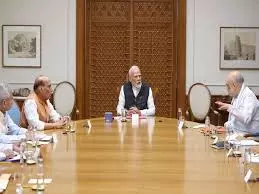AA Edit | Govt Must Weigh All Options Over Its Pahalgam Response
While the government was candid about what went wrong in the valley, the Opposition walked more than its halfway and offered unconditional support to the government for responding to terror. The world at large also stood with India what with the United Nations condemning the act; some went one step further and supported India’s right to defend itself

The decision of the government of India to impose a ban on all direct and indirect imports of goods from Pakistan and the suspension of mail and parcels through the postal system is part of the non-military options available to India to make the neighbouring country feel the impact caused by maintaining a terror network aimed at creating trouble in India. Such measures have their role but they may not be sufficient to discourage the handlers of terrorists. Any further step including the military option should be preceded by the government placing before the international community the evidence which can link the terror attack to the agencies aided and abetted by Pakistan.
Ten days have passed since the April 22 attack on unsuspecting tourists in the scenic Baisaran valley that claimed 26 lives. The government itself has admitted to security lapses in the all-party meeting that was called to condemn the attack, show solidarity with the victims and demonstrate to the world that India is united in its fight against terror. While the government was candid about what went wrong in the valley, the Opposition walked more than its halfway and offered unconditional support to the government for responding to terror. The world at large also stood with India what with the United Nations condemning the act; some went one step further and supported India’s right to defend itself.
The terror attack was less an attempt to kill some innocent human beings but more to sow the seeds of a communal strife across the country; it had all the elements required for such an aim. Indians, with their shared belief in the common humanity, sustained and nurtured by the freedom struggle, have overcome the threat, save the attempts by fringe elements to cash in on the communal feelings of some. People across the country, including those who lost their dear ones, stood up to the prophets of hate, upheld the idea of fraternity and called for strengthening harmony.
Now it is up to the government of India to pursue the matter to its logical end, which will include apprehending the terrorists and then establishing the link they had across the border. There are logistical constraints in the operation of the investigative agencies in the hilly and forested terrains of Pahalgam but their professionalism should be able to get the better of the terrorist network and their possible local accomplices. Reports suggest the ammunition for the arms the terrorists carried had their origins in Pakistan; the agencies should be able to build on them and finish their task realising that they do not have unlimited time on hand.
It is a fact that the terror network the Pakistani military establishment and a section of the ruling oligarchy sustain and nurture brings an element of uncertainty in the lives of all the 140 crore Indians. This is a menace India alone cannot end; it is for the people of Pakistan to recognise the fact that this very same network undermines their lives, too. India will be justified in making the Pakistani people understand this but any step that would touch the lives of ordinary Pakistanis should only follow presentation of solid, concrete and demonstrable evidence of the involvement of the terror network in the Pahalgam attack before the global community. The government must see it as an opportunity to end the Kashmir-centric narrative the Pakistani handlers continue to peddle and gain support in Pakistan. It is for the people to finally end terrorism; agencies and states can only take them to such a realisation.
